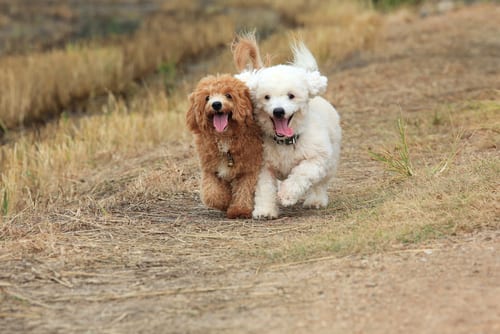
Many breeds of dog are recognized by the American Kennel Club as "herding" or "hunting" dogs. These breeds were initially bred for hunting and protection of livestock. They are now considered one of today's most intelligent dog breeds. These dogs are good watchdogs with the best instincts for hunting.
Doberman Pinscher
Recent research has shown that the Doberman Pinscher is the smartest dog in the world. They can respond to commands over 50% of the time. They are smart and watchdogs, making them intelligent. This breed is extremely loyal, strong, protective, and protective to their family.
Socialization can increase a Doberman Pinscher's instinctive intelligence. They must learn to recognize the difference between friendly people, and those with malicious intentions. This requires socialization early on. A Doberman needs a lot of attention and interaction with other dogs and people in order to build his social skills.
Doberman Pinschers are a smart breed and a good choice for both military service and police work. Doberman Pinschers are intelligent and a good choice for home guards. In fact, the Doberman Pinscher ranks among the top five smartest dog breeds, ranking behind the German Shepherd, Golden Retriever, and Border Collie. The research was carried out by canine psychologist Stanley Coren.
Labrador Retriever

The Labrador Retriever, although you may not have realized it, is one of the most intelligent dog breeds. This dog breed is so intelligent that it can learn tricks and new behaviors from watching its owners. It can even learn to open gates and doors. It can be classified as working, intuitive and adaptive. Labradors come as a range of colors. However no studies have determined which color is the most intelligent.
According to the American Kennel Club of Canada, the Labrador Retrievers are among the 10 smartest dogs breeds. Labrador Retrievers don't need more than five repetitions to master a new command and they usually obey on their first attempt. This makes this breed perfect for first-time dog owners or busy families. Labradors can also be trained to obey commands, which makes them a good choice for families with young kids.
Papillon
The Papillon is a smart, small dog breed. Its history dates back to the 14thcentury. The Papillon is a happy, loving dog. They are highly trained and agile which makes them great for agility trials. Although they weigh in at 5 pounds, they are active and alert. Papillons, despite their small size, are extremely strong and intelligent.
Papillons are one of the most intelligent dog breeds. However, they can be more clumsy due to some limitations. First, Papillons usually have a soft spot on the head that closes up almost like a baby. In rare cases, the spot may not close completely and a Papillon might die from an accidental blow.
Australian Cattle Dog
One of the smartest dog breeds is the Australian Cattle Dog. Its intelligence has allowed it to herd cattle and work efficiently. This breed is known to be very loyal to its owner. Because it is so close to its owner, the "velcro dog", also known as the Australian Cattle Dog, this breed wants to be there for you. The Australian Cattle Dog is a herd dog and has a natural tendency to bite. This is dangerous, especially if it's not taught properly during puppyhood.

Australian Cattle Dogs have a reputation for being highly trained dogs. They are good at obedience training and socialization. While they can sometimes be stubborn, they do well with positive reinforcement. They are great candidates for canine sports. They make great farm dogs and are skilled at herding animals and property patrol.
Poodle
The Poodle is one of the most intelligent dog breeds. They are known for their emotional intelligence as well as their responsiveness to humans. They have a long history of living with people. They are able to read and interpret the body language of people. Because of this, they make wonderful companions for families.
Scientific studies show that Poodles are one of the most intelligent dog breeds. They have an excellent recall memory and can easily learn new commands. They are also known for their loyality and gentleness. Poodles are intelligent enough to be ranked second only to Border Collies.
FAQ
Is it appropriate for children to own a pet at what age?
Children under five years old shouldn't have a pet. Children under five years old should not own cats and dogs.
Children who own pets often get bitten by them. This is especially true with small dogs.
Also, some breeds of dogs (such as pit bulls) can be extremely aggressive towards other animals.
Even though dogs may appear friendly, this doesn't mean they won't attack other animals.
Make sure your dog is well-trained if it's your decision to buy a dog. You should also supervise your child when she is playing with the dog.
Which of the two is more difficult to train: dogs or cats?
Both. It all depends on how you train them.
They will learn quicker if you reward them for following the instructions. They'll learn to ignore you if they don't listen.
There is no right answer. You must find the best way to teach your cat or dog.
How to Make Your Pet Happier
Pet owners often wonder how they can make their pets happy. Pet owners often buy toys, treats, or clothes for their pets. It might not work as pets may not like certain things. Some dogs don't like sweaters.
Before you buy anything for your pet, find out why. You may discover that he just likes different kinds of foods than you do. He might even hate shoes.
Another tip is to play with your pet. You can either use a ball or a Frisbee. Toss it around. You can either throw it around the room and let your friend chase it. This game is fun for both of you. It's both relaxing and enjoyable.
Another good idea is to give your pet a bath once every week or two. Bathing your pet helps get rid of dead skin cells. It also keeps his hair and skin smelling good.
Also, it is important to ensure your pet's health. Do not allow your pet to eat junk food. Give him high-quality, nutritious food. He should get plenty exercise. Get him outside to go for a run or to play fetch.
Spending time with you will be a treat for your pet. Many pets will prefer to spend time with their owners, rather than being left alone.
Last but not least, be sure to unconditionally love your pet. Do not yell at or hit your pet. Be patient with him. Never leave him alone.
Is it a good idea to spay/neuter your dog?
Yes! It is vital to spay/neuter your dog.
It helps reduce unwanted puppies and reduces the risk for certain diseases.
For example, breast cancer rates in female dogs are higher than in males.
There is also a greater chance of testicular carcinoma in males than in females.
Spaying and neutering your pet also prevents her from having babies.
Statistics
- Pet insurance helps pay for your pet's medical care, with many policies covering up to 90 percent of your vet bills. (money.com)
- In fact, according to ASPCA, first-year expenses can sum up to nearly $2,000. (petplay.com)
- Here's a sobering reality: when you add up vaccinations, health exams, heartworm medications, litter, collars and leashes, food, and grooming, you can expect a bill of at least $1,000 a year, according to SSPCA. (bustle.com)
- A 5% affiliation discount may apply to individuals who belong to select military, law enforcement, and service animal training organizations that have a relationship with Nationwide. (usnews.com)
- It is estimated that the average cost per year of owning a cat or dog is about $1,000. (sspca.org)
External Links
How To
How do you choose the right name for your pet?
When you are considering adopting a pet into your family, it is one the most crucial decisions you will make. You want your pet's name to reflect their personality.
You need to think about how others may refer to you. And finally, you should think about how you yourself would like to be referred to. Do you prefer "pet" or "dog"?
Here are some tips that will help you get started.
-
Choose a name that is appropriate for your dog's breed. If you know the breed (e.g., Labradoodle), look up the names associated with that breed. Or ask someone who knows dogs well to suggest a name based on the breed.
-
Be aware of the meaning behind the name. Some breeds are named after people or places, while others are just nicknames. A Labrador Retriever, for example, was given the name "Rover" as he was always running around.
-
Now think about what you'd like to call yourself. Do you prefer "dog" to "pet?" Do you prefer to call your dog "Puppy", or "Buddy?"
-
Don't forget to include the owner's first name. It's sensible to give your dog an owner's name. But, don't limit yourself by limiting your family's names. Your dog could become part of your family as well!
-
Keep in mind, many pets have multiple nicknames. A cat could have several names, depending on her location. While she may be called "Kitty Cat" at her home, she might go by "Molly" when visiting her friends. This is especially true for cats who live outside. They may choose to name themselves after the environment in which they live.
-
Be creative There are no rules stating that you have to stick to one naming convention. It is important to pick something distinctive and memorable.
-
Be sure to check that your chosen name does not already belong in the hands of another person or organization. This way you won't accidentally take someone else's identity.
-
Last but not least, don't forget to remember that choosing a name can be a complicated process. Sometimes, it takes time for you to choose the right name. So keep trying until you find the perfect match!